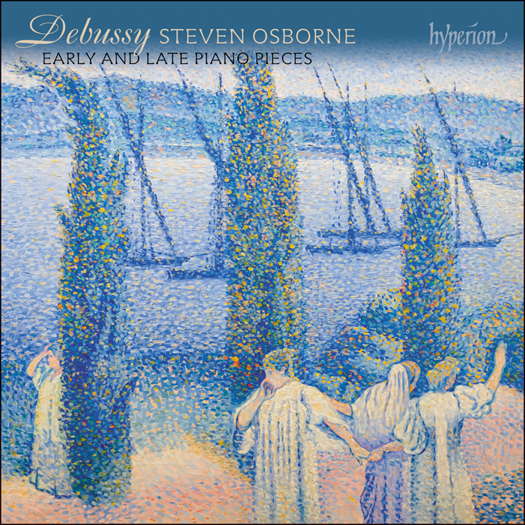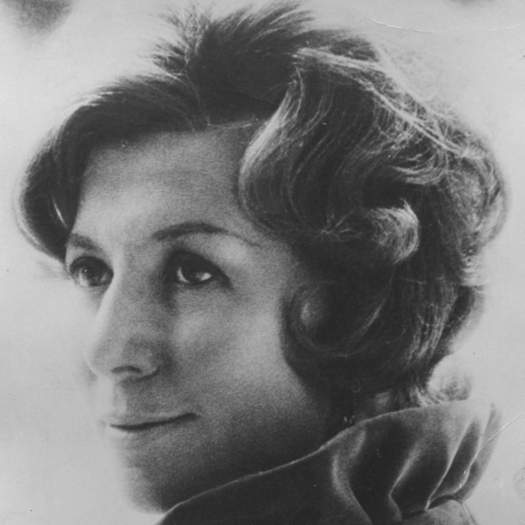- Francisco Guerrero
- Ruggiero Ricci
- Adagio for Strings
- Boris Jeremiah Brott
- Lord Berners
- USSR
- Chopin: Etude in E Op 10 No 3
- New South Wales

Absolutely Wondrous
Steven Osborne plays Debussy piano music, greatly impressing GERALD FENECH
'... despatched with warmth and a great attention to detail ...'
Was Claude Debussy an innovator and enigmatic composer? The analyst David Cox wrote in 1974 that Debussy, admiring Wagner's attempts to combine all creative arts, 'created a new, instinctive, dreamlike world of music, lyrical and pantheistic, contemplative and objective – a kind of art in fact, which seemed to reach out into all aspects of experience.' And in 1988 the composer and scholar Wilfrid Mellers wrote of Debussy: 'Because of, rather than in spite of, his preoccupation with chords in themselves, he deprived music of the sense of harmonic progression, broke down three centuries' dominance of harmonic tonality, and showed how the melodic conceptions of tonality typical of primitive folk-music and of medieval music might be relevant to the twentieth century.'
I think that we have the answer to the initial question in these two quotations. Born on 22 August 1862, into a family of modest means and little cultural involvement, Debussy showed enough musical talent to be admitted to the Paris Conservatoire at the age of ten. He originally studied piano, but found his vocation in innovative composition, despite the opposition of the Conservatoire professors. He took many years to develop his mature style, and was nearly forty when he achieved international fame in 1902 with his only completed opera, Pelléas et Mélisande.
Debussy's orchestral music was, to a considerable extent, a reaction against Wagner and the German musical tradition. He regarded the classical symphony as obsolete, and sought an alternative in his 'symphonic sketches', La mer (1903-05). His piano works, which are considered as the pièce de résistance of his output, include sets of twenty-four Préludes and twelve Études.
Throughout his career Debussy wrote melodies based on a wide variety of poetry, including his own. He was greatly influenced by the Symbolist poetic movement of the late nineteenth century, and there are a number of early and late pieces that have important parts for chorus. In his final years he focused on chamber music, completing three of six planned sonatas for different combinations of instruments.
With early influences including Russian and Far Eastern music, Debussy developed his own style of harmony and orchestral colouring – derided but unsuccessfully resisted by much of the musical establishment of the day. His works have strongly influenced a wide range of composers including Béla Bartók, Olivier Messiaen and George Benjamin, not to mention the jazz pianist and composer Bill Evans. Debussy died of colon cancer in Paris on 25 March 1918, aged fifty-five.
This delightful compilation, comprising twenty-two pieces, encapsulates all of the elusive ambiguities of Debussy's piano writing, and covers a considerable span of his artistic career.
Listen — Debussy: Danse bohémienne
(CDA 68390 track 1, 0:02-0:36) ℗ 2022 Hyperion Records Ltd :
Indeed, as one enjoys the music as it flows along, the listener can easily assess the composer's journey from his early days to his maturity. Accordingly, the programme includes the very first piece Debussy wrote for the piano: Danse bohémienne (1880) and his last: Les soirs illuminés par l'ardeur du charbon (1917).
Listen — Debussy: Les soirs illuminés par l'ardeur du charbon
(CDA 68390 track 22, 0:01-0:46) ℗ 2022 Hyperion Records Ltd :
There is also a gentle nod to moonlight, romantic and Slavonic pieces, a throwback to Haydn and several dance miniatures. Steven Osborne has this repertoire in his DNA, and his affinity with Debussy's music is intense.
Listen — Debussy: Clair de lune (Suite bergamasque)
(CDA 68390 track 10, 3:38-4:29) ℗ 2022 Hyperion Records Ltd :
Indeed, this programme is despatched with warmth and a great attention to detail, and Osborne's exemplary command of the composer's contrasting sound world is absolutely wondrous. French 'delicatessen' at its best in fine sound and detailed annotations.
Copyright © 16 November 2022
Gerald Fenech,
Gzira, Malta

CD INFORMATION - DEBUSSY: EARLY AND LATE PIANO PIECES




